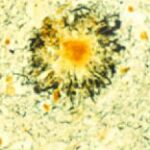 One hundred years ago, German physician Alois Alzheimer described “eine eigenartige Erkrankung der Hirnrinde” (a peculiar disease of the cerebral cortex) in Auguste Deter, a 51-year-old woman who had severe memory, language, and behavior problems. His autopsy results revealed a dramatically shrunken brain and unusual abnormalities in and around brain cells (shown here in black).
One hundred years ago, German physician Alois Alzheimer described “eine eigenartige Erkrankung der Hirnrinde” (a peculiar disease of the cerebral cortex) in Auguste Deter, a 51-year-old woman who had severe memory, language, and behavior problems. His autopsy results revealed a dramatically shrunken brain and unusual abnormalities in and around brain cells (shown here in black).
What’s this got to do with caffeine?
 Not much, except that in the past 5 years there has been an acceleration in evidence that caffeine might protect against developing Alzheimer’s disease (AD).
Not much, except that in the past 5 years there has been an acceleration in evidence that caffeine might protect against developing Alzheimer’s disease (AD).
Studies in the laboratory here and in animals here
- In the lab, “beneficial effects of caffeine … in the development of AD.”
- In mice, low doses have “a protective effect on nerve cells.”
54 people with AD in Portugal
- Looking back over the 20 years that preceded the diagnosis of AD…
- The average daily caffeine intake among the 54 people with AD was 74 mg.
- Another group with no evidence of AD had a significantly higher intake of 199 mg.
- The association with caffeine was independent of other possibly confounding factors.
6434 people in Canada
- Looking forward in people who in 1991 did not have the diagnosis of AD…
- Five years later, 194 people in the original group had AD
- There was a statistically significant relationship between more coffee consumption and reduced risk of AD.
676 European men
- The coffee drinking habits of elderly men were recorded over 10 years.
- Cognitive decline (declines in perception, memory, judgment, and reasoning) occurred in all the men, but was significantly greater in those who drank no coffee.
- The least cognitive decline was associated with drinking three cups of coffee per day
- Drinking more or less was not better.
Before deciding to drink more coffee, remember this and this.
- An 8-ounce cup of drip-brewed coffee contains about 85 mg of caffeine
- A can of Coke has about 31 mg
- Starbucks brewed decaf contains about 13 mg per 16-ounce serving
- Ben & Jerry’s Coffee Fudge Frozen Yogurt (8 oz) has 85 mg
“As little as 10 mg of caffeine can produce reliable subjective and behavioral effects in sensitive individuals,” say Dr. Roland Griffiths, a professor of behavioral biology and neuroscience at the Johns Hopkins School of Medicine.
A PubMed search to update this post revealed the results of the Honolulu-Asia Aging Study study by researchers at the University of Hawaii, in Honolulu, which support the protective effect of cafeine. “Coffee and caffeine intake in midlife were not associated with cognitive impairment, dementia, or individual neuropathologic lesions, although higher caffeine intake was associated with a lower odds of having any of the lesion types at autopsy.”
11/11/06 08:34 JR, updated 1/29/11 20:32 JR